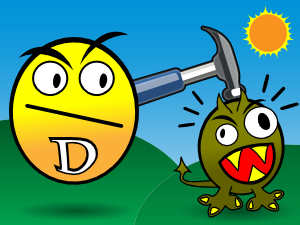Organic Fruits & Vegetables
Author: Dr. Stephen Chaney
Are organic foods healthier for us than conventionally grown foods, specifically fruits and vegetables? The controversy about the benefits of organically raised produce continues. In fact, about the only thing that all sides agree on is that:
- Organic foods have lower pesticide and herbicide residues and cause less environmental pollution.
- Organic foods generally cost more.
But that is where all agreement ends.
- Some experts argue that the pesticide levels on conventionally grown fruits and vegetables are within safe levels and that any risk from the pesticides is outweighed by the health benefits of the fruits and vegetables themselves.
- Some studies have suggested that organic foods, fruits and vegetables, are healthier because they have higher antioxidant levels, while other studies have reported no nutritional differences between organic and conventionally grown fruits and vegetables.
Benefits of Organic Food?
The present study (Baranski et al, British Journal of Nutrition, doi: 10.1017/S0007114514001366) tried to overcome the shortcomings of many of the previously published reports.
To begin with this study was a meta-analysis that combined the results from 343 of the best designed previous studies to increase the statistical power of the analysis. In addition, the investigators utilized a type of statistical analysis that was superior to previously published studies. In short, it was a very good study. It does show some benefits of organic food.
The results were fairly clear cut:
- Pesticide residues were four-fold lower in the organically raised produce than the conventionally raised produce. This result has been consistently seen in all of the previously published studies, and is probably the #1 reason that people choose organic produce. It is also one of the most agreed upon benefits of organic food.
- Polyphenol antioxidant levels were significantly higher in the organically raised produce. The percent increase ranged from 19% to 69% depending on the polyphenolic compound tested. This increase has not been seen in all previously published studies, but would represent a side benefit if true.
- Levels of the toxic metal cadmium were significantly less in the organically grown fruits and vegetables. The authors speculated that the cadmium found in conventionally grown produce came from the inorganic fertilizers that were used.
Should You Choose Organic Supplements?
If organic foods are better for you than conventionally grown foods, does that mean that you should also choose organic supplements? While that idea sounds logical, the reality is actually more complex.
While organic foods clearly have less pesticides and toxic metals than conventionally grown foods, the level of those contaminants is not zero – even in foods with organic certification. The problem is that our environment is so polluted that no farm is contaminant free. A farmer can use the best organic practices, but if their groundwater is contaminated or pesticides from neighboring farms blow on to their farm, some of those toxic residues will end up in their “organic” crops.
So with supplements, “Organic” certification is not an absolute guarantee of purity. Instead you should insist on getting your supplements from a company with a very rigorous quality control program and a policy of rejecting any raw materials that contain contaminants of any kind.
The Bottom Line
1) The latest study shows that pesticide residues are four-fold lower in the organically raised produce than the conventionally raised produce. This result has been consistently seen in all of the previously published studies, and is probably the #1 reason that people choose organic fruits and vegetables.
2) Polyphenol antioxidant levels were significantly higher in the organically raised produce. The percent increase ranged from 19% to 69% depending on the polyphenolic compound tested. This increase has not been seen in all previously published studies, but would represent a side benefit if true.
3) While one of the benefits of organic foods is they are less likely to be contaminated than conventionally grown foods, an organic certification is not a sufficient proof of purity when you are choosing supplements.You should insist on getting your supplements from a company with a very rigorous quality control program and a policy of rejecting any raw materials that contain contaminants of any kind.
These statements have not been evaluated by the Food and Drug Administration. This information is not intended to diagnose, treat, cure or prevent any disease.






